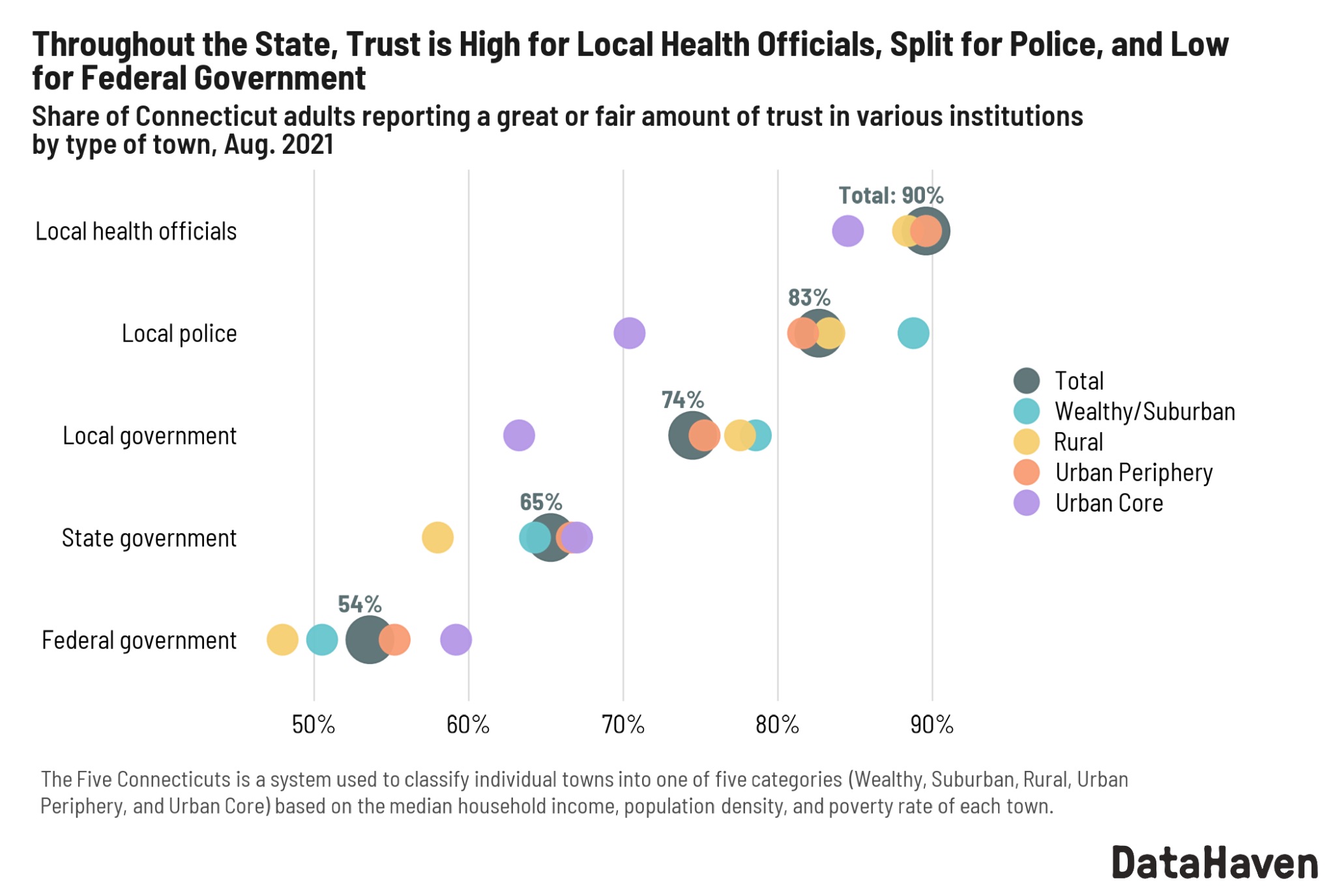DataHaven survey shows Connecticut residents’ well-being
New Haven nonprofit DataHaven has released its 2021 Community Wellbeing Survey, which measures quality of life in every Connecticut town.

Tyus Sheriff, Contributing Photographer
Connecticut residents have experienced a modest increase in financial well-being, a decrease in mask-wearing since last year and a change in levels of trust in public officials, according to a recently-published report from New Haven-based nonprofit, DataHaven.
Published on Oct. 6, the 2021 DataHaven Community Wellbeing Survey is based on 5,145 phone interviews conducted this summer. It measures well-being in every Connecticut town across different categories including healthcare coverage, attitudes toward vaccines and masks, social trust, fear of gun violence and financial, food and housing insecurity. The report breaks the data down according to the participants’ race, age, gender, income and, in some cases, political affiliation.
The survey is traditionally conducted every three years — with the 2021 survey falling into this cycle. However, due to the pandemic, DataHaven conducted a smaller-scale survey last year as well. DataHaven Executive Director Mark Abraham ’04 told the News that he wants the data to empower Connecticut residents.
“We would like to see everyone engaged in civic participation; voting; just being involved in their communities in different ways,” Abraham said. “Our vision would be that everyone has all the information they need [to] be better able to change their neighborhood or community in ways that are beneficial to everyone.”
In Connecticut, close to 20 percent of eligible residents are unvaccinated as of Oct. 13. DataHaven’s report looks at who these people are and how willing they would be to get the vaccine.
DataHaven found that vaccination rates vary among populations within the state. In a press release, it noted that the rate of people who would definitely not get the vaccine was “significantly” lower among Black, Latinx and younger adults. Additionally, the report suggested that many low-income unvaccinated adults may want to get the vaccine but require additional resources to access it.
Dean of the School of Public Health Sten Vermund wrote in an email to the News that he saw many opportunities from the data for promoting vaccinations.
“Notice that in the ‘definitely will not get group,’ the financially insecure are 3-times better represented than the financially secure,” Vermund wrote in an email. “Behavioral economics would suggest that financial incentives might help this subpopulation see the merits of vaccination, alongside job mandates.”
Vermund also acknowledged the limitations of government health authorities and academics. He added that officials will need to creatively work and talk with vaccine skeptical communities, which will require “special outreach.”
The survey also showed that trust for local officials is higher than for state or federal officials. In particular, trust for local health officials scored a survey-high of 90 percent.
Yale Institute for Global Health Director Saad Omer told the News that this was in line with previous research.
“That is not new, because these people live in the communities, they have credibility,” Omer said. “People’s perceived competence of their healthcare providers, and whether they have their interests at heart, but also whether they have any conflicts or not—because these things are considered for local health officials, and they score very [well].”
When asked what the next pandemic-related policies should look like, Omer gave three suggestions: create a vaccine verification system, mandate vaccines on federal airlines and spearhead programs to improve local healthcare providers’ vaccine communication skills to patients. Overall, Omer is optimistic about Connecticut’s outlook, he said.
On a similar note, Vermund wrote in an email to the News that local organizations are important in the next phase of vaccine distribution.
“Community-mobilization is best done by community-based organizations,” Vermund stated. “With investment of targeted resources, [community-based organizations] can be engaged to bring vaccines to the people through neighborhood vaccine fairs, clinics in churches, mobile vaccine vans, and the like…Messaging can be specially crafted to be meaningful for different racial/ethnic subgroups.”
Abraham said that he has seen the data guide policymakers and citizens, making them more aware of the need to confront systemic racism. He noted that, while many people know of racial inequity data nationwide, they may not understand the magnitude of such problems in their own communities.
DataHaven was founded in 1992.










